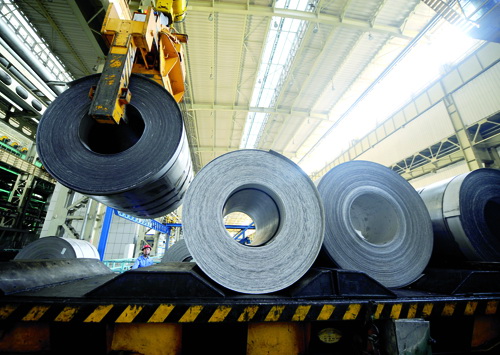|
 |
|
Workers at Taiyuan Iron and Steel Co.hoist stainless steel rolls. The industry continues to grow despite difficulties |
What kind of economic policies will be adopted by China in 2013? Will any breakthroughs be achieved? These are among questions concerned by China-watchers after the country's once-in-a-decade leadership transition. The Central Economic Work Conference (CEWC) held in Beijing on December 15-16 provided the answers: China will further expand reform and opening up and macroeconomic policies will continue with the aim of "actively and steadily" pressing the economy forward.
The CEWC is held at the end of each year to discuss issues in the domestic and international economies and determine plans for the next year.
This conference mapped out six major tasks for Chinese economy in 2013, emphasizing that China would maintain efficient and sustainable growth. The CEWC also concluded that the international economic situation would still be turbulent. The global economy is expected to maintain low growth, various forms of protectionism will resume and the pressure of potential inflation and asset bubbles will expand. The global economy has entered a period of profound transition from a period of fast growth in the pre-crisis years.
However, expanding domestic demand, improving innovation and continuing transformation of economic growth pattern would present new opportunities for China's economy.
Zhang Liqun, a macroeconomic researcher at the State Council's Development Research Center, said the new top leaders are confident about economic development in 2013 and the Chinese economy is likely to maintain steady growth.
Breakthroughs for reform
"Reform" was the main buzz word at the 2012 CEWC. Xi Jinping, General Secretary of the CPC Central Committee, said at the conference that China should insist on a market economy and further reform needs "greater political courage and wisdom." He called for implementation of reform measures and stressed the drafting of new ones when needed.
The conference stressed that China must deepen reforms and open itself up more to the outside world.
"This shows the resolution of the Central Committee of the Party," said Lian Ping, chief economist of Bank of Communications. "The terms used throughout the conference, such as 'overall scheme,' 'roadmap' and 'timetable' for the reform are inspiring and indicate that future reforms will not be confined to small matters but are focused on major issues."
The Chinese economy is facing immense difficulties in pursuing its economic reforms and readjusting its growth structure, Lian said. Reforms can only be implemented if there are changes to the country's wealth distribution and financial system, if monopolies are broken up and if the household registration system, or hukou, is overhauled.
Such grand changes must come from the top, and leaders have already signaled their openness to expand reforms.
Upon his election as the Party chief, Xi paid his first inspection tour to south China's Guangdong Province, the bellwether of China's reform and opening up over three decades ago.
"Xi's tour illustrates to the world that the country's new leaders will follow down the path of reform and opening up initially put forward by Deng Xiaoping," said Wang Yukai, a professor at the Chinese Academy of Governance.
Chen Yao, a researcher with the Institute of Industrial Economics at the Chinese Academy of Social Sciences (CASS), said previous reforms were analogous to "crossing the river by touching the stones." This time around, Chen said, the CPC Central Committee is stressing foresighted reform planning from the top down. A roadmap and timetable for a new round of reforms are expected to be released in March 2013 during the session of the National People's Congress, China's top legislature.
|